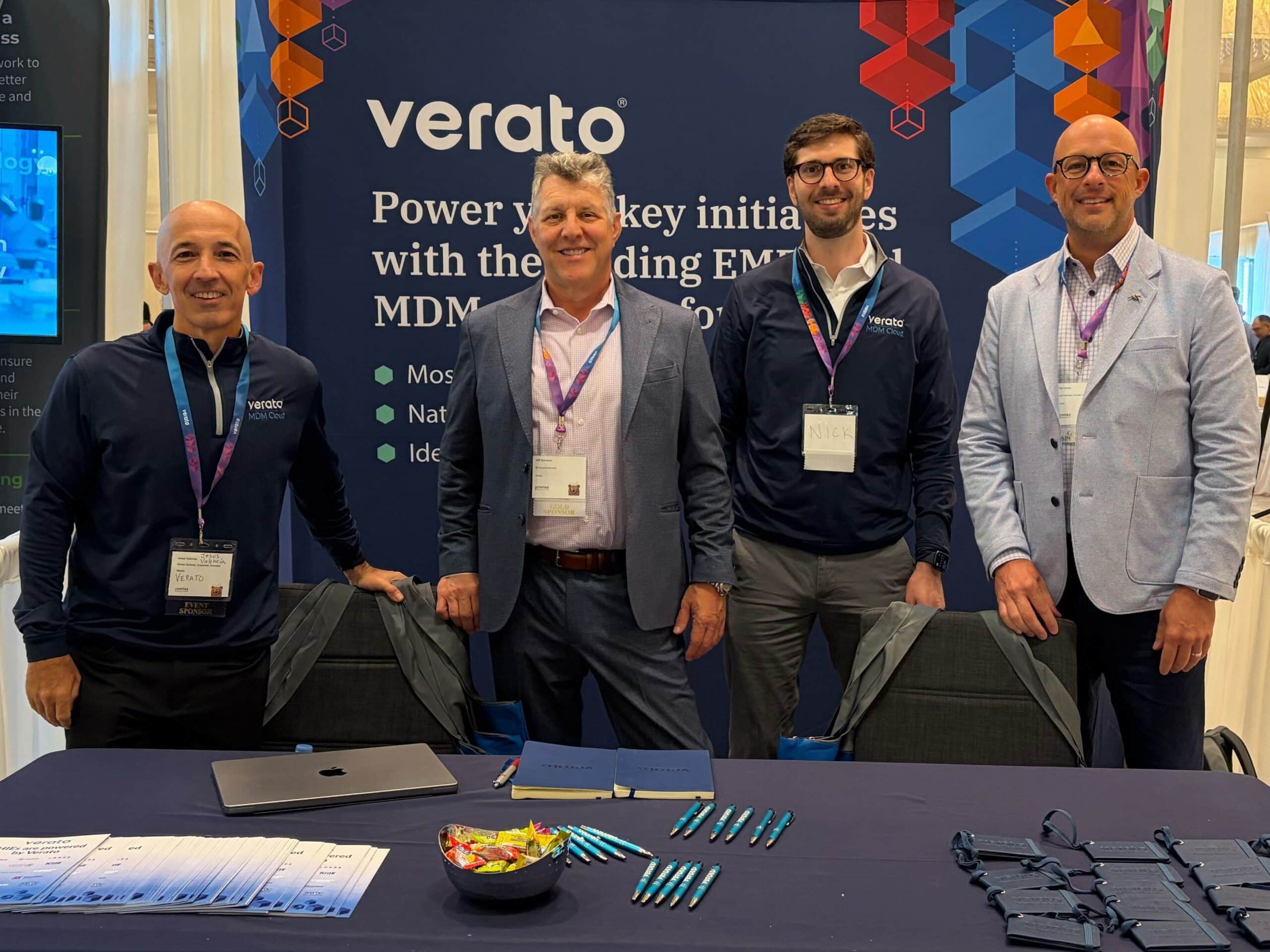Every year, the Civitas Networks for Health Annual Conference brings together the nation’s leading health information exchanges (HIEs), health data utilities (HDUs), public health leaders, and innovators shaping the future of connected care.
This year’s gathering in Anaheim, California (September 28–30, 2025) focused on Bridging Data and Doing—much like Civitas’ members and network serve as the bridge between “data” and “doing” in health and healthcare.
Across every discussion, one message was clear: the era of trusted, whole-person interoperability has arrived.
Setting the tone: Trust, identity, and leadership
The conference opened with remarks from Joe Hickey, Vice President of Clinical Data Markets at Verato, who reminded attendees “when identity is trusted, everything else gets easier.” His main-stage message, delivered just before the first keynote, set a powerful tone for the event, highlighting that interoperability, AI, and innovation all depend on a trusted foundation of identity data.
That message echoed throughout the week’s discussions, from whole-person care to public health data to the keynote Fireside Chat with Dr. Theresa Cullen, who emphasized compassion, data equity, and the need to “stay grounded in community.” Together, these conversations framed a new vision for interoperability that is both human-centered and data-driven.
The new definition of interoperability
For years, interoperability was defined by technical standards and APIs. At Civitas 2025, it became clear that it has evolved into something bigger: a shared mission to make data trustworthy, actionable, and equitable.
Sessions such as the keynote “A Vision of One Health System, CMS-Aligned Networks, and What’s Next for Interoperability” emphasized that data movement alone is not enough. True progress requires trust in identity, clear governance, and collaboration between the public and private sectors.
With CMS’s new interoperability rule (CMS-0057) mandating FHIR-based prior authorization by 2027, all CMS payers and providers must support standardized data models. This means the future depends on reliable intermediaries—HIEs and HDUs that can ensure secure data exchange at scale.
“If you can’t trust who is who in the data, everything downstream becomes harder,” Joe Hickey, VP of clinical markets at Verato, noted.
Health data utilities: From vision to implementation
One of the most anticipated sessions was the launch of the Health Data Utility (HDU) Capability Model v2, developed by the Consortium for State and Regional Interoperability (CSRI) in partnership with Civitas.
The model, built around 160 specific capabilities across five stakeholder domains, provides a roadmap for states to standardize, assess, and mature their HDU operations. It defines what it means to be a true utility—statewide, nonprofit, multi-stakeholder, and serving both public and private needs.
The message was clear: HDUs are the backbone of equitable data exchange, enabling states to align public health, Medicaid, behavioral health, and social service data under one trusted framework.
This shift marks a major milestone in the evolution from data exchange to data governance.
Cross-sector collaboration and whole-person care

A notable throughline across the conference was the growing emphasis that whole-person care requires whole-person data.
Sessions such as “Integrating Cross-Sector Data for Whole-Person Care” and the “Roundtable on Transforming Whole Person Care” showcased emerging models that connect health, housing, justice, and human services data into unified systems of support.
Alameda County proves that Social Health Information Exchanges (SHIEs) can extend far beyond traditional resource directories. By building a unified, trusted identity layer, Alameda is able to connect health, behavioral, and social services data across agencies and community partners for over one million residents.
The SHIE model, powered by Verato, integrates data from Medicaid, education, and criminal justice sources to create a complete view of every individual, helping case managers coordinate wrap-around services for complex populations.
AI in healthcare: Moving from hype to pragmatism
Artificial intelligence emerged as a focal point at Civitas 2025, where conversations emphasized realistic implementation strategies over speculation or hype.
In “HDU and AI: Hype vs. Reality,” panelists from IBM, LANES, and CaseWorthy emphasized human-in-the-loop governance—the principle that AI should not make final decisions without human oversight—shared liability, and transparent auditing as non-negotiables for ethical AI adoption.
Similarly, the Healthix Portal AI Integration session demonstrated how AI can already reduce clinician burden by summarizing patient histories, preparing visit recaps, and surfacing insights from scattered records.
The takeaway: AI will accelerate progress, not replace it. The organizations seeing success are those deploying AI to amplify trusted data, not circumvent it.
From data trust to data impact
Civitas 2025 made it clear that the next phase of interoperability will be measured not by APIs or acronyms, but by impact:
- Are public health agencies receiving timely, reliable insights?
- Are hospitals reducing readmissions and improving maternal outcomes?
- Are social service providers getting the information they need to support the most vulnerable?
The Arkansas SHARE HIE, demonstrates what’s possible. Verato enables SHARE to match maternal and newborn records across hospitals and clinics statewide, integrate Medicaid rosters, WIC eligibility data, and maternal health programs into a unified collaboration approach for better care coordination.
By leveraging all of these data sources, SHARE ensures early identification and proactive outreach for children, pregnant, and postpartum women.
Looking ahead
As Civitas and CSRI continue to refine the HDU model and align with federal priorities, 2026 will be the year when many of these frameworks turn into operational realities.
The path forward is clear:
- Build on trusted identity as the foundation.
- Advance governance and consent frameworks that earn participation.
- Apply AI responsibly to transform data into action.
As Civitas 2025 made clear, the organizations that win the future will be those that can build trust at scale.
